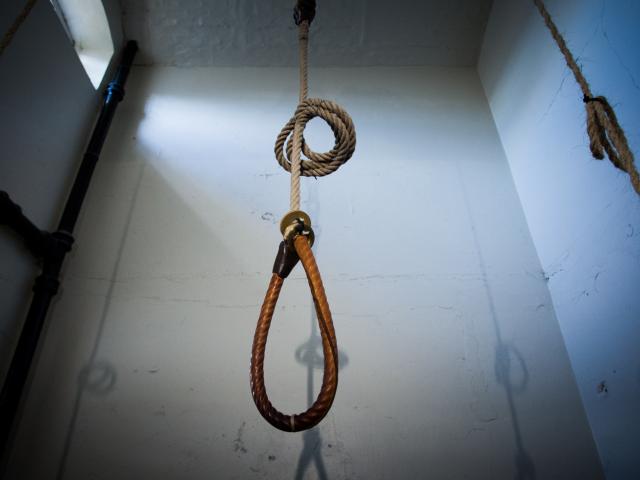
Final death sentence in military case no. 174 after appeal denied by Higher Military Court of Appeals. EIPR demands non-ratification of sentence until the Military Court of Appeals looks into petition
Press Release
The Egyptian Initiative for Personal Rights condemns the ruling issued on Monday, March 26, by the Higher Military Court of Appeals denying the appeal filed by Ahmed Amin Ghazali Amin and Abd al-Basir Abd al-Raouf Abd al-Muwalli Hassan in case no. 174/2015/West Cairo military felonies. That case, known in the media as the “advanced operations committee,” saw the defendants sentenced in presence to death by hanging. With the denial of the appeal, the sentence becomes final and subject to execution. The military court also denied appeals filed by the defendants sentenced to prison for terms ranging from 15 years to life, while it accepted the appeal of the death sentences handed to Mohammed Fawzi, Reda Motamad, Ahmed Mustafa, and Mahmoud al-Sherif, all of whom were charged with planning the assassination of several military and political figures and targeting military and police facilities.
The EIPR urges the president to use the authority imparted to him by the law to substitute the death sentence with a less severe punishment until the petition to reopen the case is considered. The president has previously commuted a death sentence against Mohammed Hussein on 22 January 2017. After Hussein was convicted of killing a child in the case 813/2014 Qina Plenary Felonies and sentenced to death, the president issued Decree no. 50/2017 commuting the sentence to life in prison.
There were many due process concerns about the trial from its onset. “It’s established that the confessions were clearly extracted under torture,” Mohammed al-Baqer, the attorney for two of the defendants in the case, said in a press statement. He added that the court “ignored the defendants’ denial of the charges against them and the retraction of their confessions, which they said were obtained through serious abuses against them.” He added that the defendants were questioned by the Military Prosecution without lawyers and without seeing the physical and other case evidence against them.
The case became known in July 2015 when the Ministry of Defense posted a video on its YouTube account, titled “Biggest terrorist cell threatening national security apprehended.” The video showed the several of the defendants confessing to involvement in a “specialised operations” group and carrying out several acts of sabotage and arson. Several defendants in the video also confessed to receiving training in camps outside the country, where they learned to carry out assassinations and abductions and manufacture explosive devices. For many of the defendants, the Defense Ministry video was the first indication that they were in custody, having been forcibly disappeared for various periods, according to their defense attorney.
The Military Intelligence investigation report, written by Officer Hani Sultan who arrested some of the defendants, says that Military Intelligence learned of a cell monitoring the movements of important figures, among them the supreme commander of the armed forces, and planning attacks on public and private installations and property. On the basis of this, Group 77 with Military Intelligence arrested members of the cell. The Military Prosecution charged the defendants, among other things, of joininga group established in violation of the law in the year 2015, participating in a criminal conspiracy with the purpose of committing crimes of sabotage, obtaining state secrets (a schematic diagram of the Galaa Military Hospital), and possessing firearms and explosives.
Counsel for the defendants obtained a document from the Prisons Authority showing that Abd al-Basir Abd al-Raouf Abd al-Muwalli was not placed in any of the prisons under the authority’s jurisdiction from June 2, 2015 to June 13, 2015. He was admitted to the Tora Prison on June 13, 2015 after he was sentenced to death by hanging in case no. 174/2015.
The EIPR fears that the men sentenced to death will meet the same fate as defendants in the Arab Sharkas case. The Higher Military Court of Appeals denied the appeals filed by defendants in that case on March 24, 2015, and six of the defendants were executed by hanging on May 17, 2015. Similarly, four of the defendants sentenced to death in presence in the Kafr al-Sheikh stadium bombing case, no. `325/2015/Alexandria military felonies, were executed on January 2, 2018. In addition, on March 22, 2018, Suleiman Muslim Abd al-Garabia and Ribhi Gomaa Hussein Hassan were executed in connection with case no. 382/2018/Ismailiya military plenary felonies, after the military appellate court denied their appeal on February 6, 2018. They were convicted of the murder of a military sergeant and private and the possession of weapons and ammunition.
The EIPR reiterates its demands for the voiding of the death sentences and a retrial for the defendants before the competent civilian court, especially in light of the abuses and legal violations that marred the case. The defendants’ attorneys affirm that the prosecution and trial did not meet minimum standards for a fair trial, pointing to the enforced disappearance of the defendants and their ill treatment and torture to coerce confessions, and absent the presence of their attorneys. The court did not admit the defendant's’ testimony that their confessions were obtained under torture, their denial of statements attributed to them in the written judgment, or the statements of defense witnesses, demonstrating a clear violation of the right to a fair trial.
The EIPR again notes that the unprecedented recourse to the death penalty in recent years has not checked the rising frequency of security threats. In fact, it has undermined the chances for a transparent, serious social debate about the dimensions of such threats and the most effective ways to meet them.



